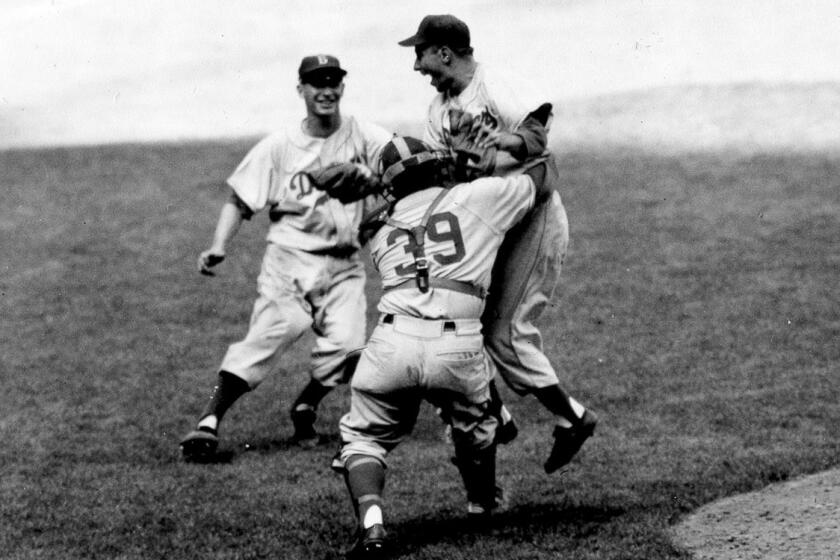Dodgers’ Secret Plan for L.A.: NFL Stadium, Upscale Complex
As the Dodgers stumbled through two months without a manager this fall, the organizational vision extended far beyond the diamond.
They assigned the code name “Five Ton Gorilla” to a secret proposal to remake the landscape of sports in Los Angeles and the image of owner Frank McCourt, pitching the NFL on ditching the Coliseum for a new stadium in Chavez Ravine, and signing up with one of the nation’s top real estate developers to create a retail and entertainment complex in the Dodger Stadium parking lot.
For the record:
12:00 a.m. Dec. 31, 2005 For The Record
Los Angeles Times Saturday December 31, 2005 Home Edition Main News Part A Page 2 National Desk 3 inches; 110 words Type of Material: Correction
Dodgers and NFL -- An article and headline in Friday’s Sports section said New York real estate developer Larry Silverstein joined Dodger officials to propose to National Football League officials that an NFL team be put in a new stadium at Chavez Ravine in the Dodger Stadium parking lot. In fact, developer Larry Silverstein, the head of rebuilding at the World Trade Center site, is not involved in the Dodgers’ proposals; a Boston lawyer named Larry Silverstein is, and he was at the meetings. Sources who said the New York developer could have built the retail and entertainment component of the Dodgers’ broader proposal were unaware of the mistaken identity.
In proposing McCourt acquire an NFL team, the Dodgers reportedly suggested the league wanted to move the Houston Texans to Los Angeles.
“That statement has as much credibility as the idea of the Dodgers returning to Brooklyn,” league spokesman Greg Aiello said Thursday.
The NFL and the Dodgers confirmed this week the parties held two meetings this fall about the possibility of building a football stadium next to the complex. Both sides characterized the discussions as preliminary and, amid an outcry from Los Angeles civic leaders, said the talks had ceased unless and until the NFL failed to reach a deal with the Coliseum.
Yet the Dodgers were serious enough to present a proposal that involved Larry Silverstein, a prominent New York real estate developer heading the rebuilding of the World Trade Center site. Silverstein joined two Dodger executives in meeting with NFL officials, and several sources said Thursday his firm could have built all but the football stadium in a project estimated at 1 million square feet.
The suggestion about moving the Texans was one of several details reported Thursday by the Boston Herald, which said it obtained confidential Dodger memoranda in an anonymous mailing. Dodger spokeswoman Camille Johnston confirmed the authenticity of the documents but would not answer questions about any details.
Among the details: The Dodgers proposed building a 65,000-seat football stadium -- too small by NFL standards for a Super Bowl -- for about $600 million, using revenues from naming rights, personal seat licenses and concession contracts so as to “effectively spend other peoples’ cash” to finance construction.
The NFL appeared receptive to McCourt’s building a stadium on Dodger property but reluctant to grant him a team, according to an executive summary prepared by the Dodgers. “We indicated there was no desire to move forward with this project unless Frank would be in control of both the stadium and the team,” the summary read.
McCourt has long been concerned about his image within the community and last season hired Sitrick and Co., a public relations firm best known for crisis management. An internal memo claimed McCourt could bask in the “psychic benefits of being the guy that brought football to L.A.,” and an advisor told McCourt the project would so wow the NFL that the proposal would be “largely a sales effort which we should achieve very easily.”
The memos also advised McCourt not to attend the NFL meetings -- he did not -- because “distance/deniability is not a bad thing” and warned he would face “heat” if the talks became public.
Johnston called the memos “a summary of things discussed” and prepared for McCourt.
“What’s in the documents should not be put in the category of something endorsed by Frank McCourt,” Johnston said.
If McCourt has not endorsed those proposals, and if he supports the Coliseum, as he said in a statement Wednesday, why would he authorize Dodger executives to meet with the NFL twice about a possible football stadium on Dodger property?
“Exploratory meetings were held to know what all the scenarios were” about the viability of the Coliseum and the possible alternative of Dodger Stadium, Johnston said. Because the Dodgers and the NFL agreed the focus would remain on the Coliseum, Johnston said, “Everything in those plans is moot.”
Johnston said the documents had been stolen and that the Dodgers plan to file a police report on Tuesday.
The Dodgers discovered the theft three weeks ago, when a copy of the documents was returned to the team.
The Dodgers did not file the report at that time, she said, but did initiate an investigation in an unsuccessful effort to solve the theft before the documents were widely distributed and publicized.
Los Angeles Police Dept. Lt. Paul Vernon said the Dodgers have reported a “theft from the organization” and said detectives would meet with team officials after the relevant executives return from the holidays.
The LAPD does not know what specific items were taken, he said.
Times staff writers Sam Farmer and Richard Winton contributed to this report.
More to Read
Are you a true-blue fan?
Get our Dodgers Dugout newsletter for insights, news and much more.
You may occasionally receive promotional content from the Los Angeles Times.











